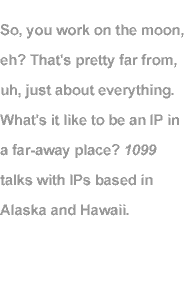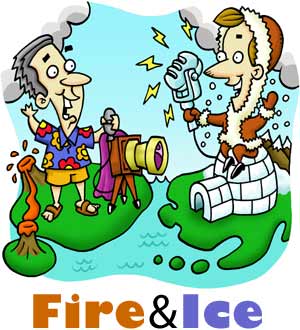 |
|
||||||||||||

|

|
|
By 1099 Staff
|
Mainland Americans typically think of Alaska and Hawaii as opposite extremes, as environments and cultures that could hardly be more different. Hawaii is bright, warm, and welcoming, Alaska dark, cold, and forbidding. However, the two states share the same geographic relationship to the 48 contiguous states, and this, for better and worse, affects the professional and personal lives of the people who live there. Two IPs -- one Hawaiian, one Alaskan -- talk with 1099 about living and working as a freelancer in the most geographically isolated regions of the United States. Our man in Hawaii, Brad Lewis, earns his living as a photographer. For the past 15 years, Lewis has built himself a cottage industry out of photographing just about every angle of Mt. Kilauea, an active volcano on the island of Hawaii that produces, on average, 900,000 cubic yards of roiling lava per day. His photographs have appeared in National Geographic, Life, Newsweek, and many other esteemed publications. More than 2,500 miles to the north, in Homer, Alaska, radioman and journalist Geo Beach writes and produces his radio commentaries "Top of the Planet" and "World of Mouth," both of which are broadcast by National Public Radio (NPR) and Public Radio International (PRI). Interestingly, Lewis moved to Hawaii from Alaska, and Beach says he would move from Alaska to Hawaii if forced to abandon his current home. Pure coincidence, we think. Brad Lewis -- Hawaii 1099: What were the circumstances of your move to Hawaii? Why Hawaii? Lewis. It was rather a fluke that I ended up here. I had been living in Alaska, built my cabin, and thought I would live there happily ever after. I came to Hawaii on a vacation, saw opportunities, and never left. The bottom line was: Why slip on the ice on the way to the outhouse, when I could be naked in my garden year-round? 1099: Did you move there in order to become a freelancer, or did you become a freelancer once you moved there? L: I became a freelancer once I moved here. In Alaska, I was doing geology and archaeology jobs in the bush. Great fun, but I was working for someone else. 1099: Have you ever been somebody else's full-time employee in Hawaii? L: Never. 1099: Why do you prefer freelancing to wage-slavery? L: Working for myself has limitless possibilities. I can accomplish anything and everything. As an employee, there are always limitations. Creative motivation is not always rewarded. Plus, I could never work as hard for someone else as I work for myself. 1099: As a freelancer, what challenges do you face in Hawaii that your counterparts in the 48 contiguous states probably don't have to deal with? L: In Hawaii, the economy is terrible and has been for the last 12 years. The opportunities that are on the mainland don't exist here. 1099: How do you meet these challenges? L: By creating my own niche. In this case, the volcano. By photographing the most active volcano in the world and seriously marketing it on a global basis. Thus, I am not jerked around by the whims of the local economy. 1099: How do you deal with being isolated from the mainstream of your profession? L: This is a great advantage to me. I would want it no other way. The physical isolation keeps what I do unique. On another level, however, I am in touch with the top professionals around the globe via email, online photographer forums, and the Web. 1099: What pleasures do freelancers in Hawaii enjoy that their mainland counterparts do not? L: Crystal clean air. Consistent golden light. Vibrant colors that knock your socks off. A pleasant year-round climate. And slow growth due to the poor economy. 1099: How often does your work take you outside of Hawaii? L: I travel outside of Hawaii about every three months. Each trip is from two to three months. I usually travel with my wife and young daughter. We have homes in Alaska and Utah (humble cabins in the woods), so these are usually our destinations. I pursue photography as it interests me when I am away from Hawaii. 1099: Do you think you have more or fewer competitors in Hawaii than you would have elsewhere? L: Fewer. That is one of the beauties of living here. 1099: Can you imagine moving back to the continental U.S. permanently? L: Actually, we were thinking of doing just that -- for my daughter. Schools are quite bad in Hawaii. Some of the worst in the nation. We were going to move back to our place near Park City, Utah, but have decided against it due to the incredible growth and development of that area (and just about every other area we would consider going to). Hawaii's slow economy is a blessing. So we are content to stay here. We may, however, move into the town of Hilo, which has better schools than our present area. 1099: Do you think you'll ever give up freelancing for a full-time staff job? L: No way! I could never work for anyone again in my life. And I am making sure that I will never have to. Business is thriving. 1099: If you had to move away from Hawaii forever, where would you go? L: Perhaps back to Alaska. Or to Utah or Idaho. Unfortunately, all the good places are getting too crowded. There are just too many people wanting to be in the beautiful places. Who wouldn't? Geo Beach -- Alaska 1099: What were the circumstances of your move to Alaska? Why Alaska? B: I moved to Alaska on Winter Solstice, the darkest day of the year, in 1983, primarily to work on a novel that had nothing to do with Alaska. I did that, but I also got involved with public radio as a storyteller. Alaska appealed to me because it was a part of the country I hadn't lived in, and because it provides an expatriate perspective with the convenience of speaking English and spending dollars. 1099: Where did you live before you moved there? B: I'm a Swamp Yankee -- I was raised on the New England coast: born in Boston, grew up in Maine, schooled in seacoast New Hampshire and then Connecticut. But just prior to moving to Alaska I was actually in West Virginia with a start-up that became "Mountain Stage," the longest-running and most successful music show on public radio. 1099: Did you move in order to become a freelancer, or did you become a freelancer once you moved there? B: I was freelance before I moved to Alaska. 1099: Have you ever been somebody else's full-time employee in Alaska? B: No. 1099: Why do you prefer freelancing to wage-slavery? B: In a word, freedom. Freelancing gives me creative freedom in radio, latitude I couldn't find working within the staid structure of the public broadcast monolith. I think the national and international awards I've received [from the Society of Professional Journalists, for example] demonstrate that that's been a good choice, that I produce better material freelancing than what's churned out inside the system. There's also substantially more personal freedom over scheduling and travel. The price, of course, is that you work more and harder. The trick is to make sure that with all that freedom you're not working for free. 1099: As a freelancer, what challenges do you face in Alaska that your counterparts in the 48 contiguous states don't have to deal with? B: Four time zones to New York. But the other challenges have been diminishing. Airfares and long-distance phone charges have dropped dramatically in the past ten years. FedEx puts me just one day away from any tangible product, like a sound recording on DAT (Digital Audio Tape), which basically means I'm playing in the same ballpark as everybody else. And email has sped things up dramatically; it keeps me wired in real time, with great cost savings over fax or voice. Alas, it's still a long series of flights to the East Coast, usually 12 hours elapsed time, and that's quite unlikely to change anytime soon. And I'm always battling for broader bandwidth into my offices; I think Alaska will always be a step behind in that race.
1099: How do you meet these challenges? B: Phone, fax, FedEx, and email. And remembering to accentuate the positive: every one of these challenges is a coin with another face. So I'm far away from New York. I'm in Alaska, the Great Land, where millions of city folks would love to travel and experience the natural environment. I'm living what everybody else just dreams of. 1099: How do you deal with being isolated from the mainstream of your profession? B: I stay in touch with colleagues through email primarily and telephone. I try to make it a habit to get to national conventions regularly to shake hands and grab a coffee or a drink with friends and producers so our relationships don't tip too far toward the virtual from reality. 1099: What pleasures do freelancers in Alaska enjoy that their mainland counterparts do not? B: Real reality: Alaska itself. So much of everything these days isn't reported, it's just repeated. Up here the material that goes into my radio pieces is not regurgitated, it comes straight from life. 1099: How often does your work take you outside of Alaska? B: I get "outside" (Alaskans' term for everyplace that's not Alaska) about four times a year -- for conferences, to report my radio stories, and for vacation. I try to combine those objectives into the same trip when possible. 1099: Do you think you have more or fewer competitors in Alaska than you would have elsewhere? B: Well, because I produce radio pieces for national distribution, competition within Alaska really isn't an issue. As far as national competition, I think Alaska has proved advantageous in some regards because it's unique and attracts attention. On the other hand, it can seem to some to be on the margins, and I've had to demonstrate that I'm up on what's happening. 1099: Can you imagine moving back to the continental U.S. permanently? B: I frankly can't imagine moving anywhere permanently. Sounds like a graveyard. 1099: Do you think you'll ever give up freelancing for a full-time staff job? B: Sure, with the right outfit. But I'd have to be assured the creative freedom I exercise now, or else I just can't believe I'd be able to do the kind of work I'm doing now: telling the real stories, telling the truth, in ways that excite a new generation of radio listeners. 1099: If you had to move away from Alaska forever, where would you go? B: Hawaii, Puerto Rico or the U.S. Virgin Islands, Maine -- one of the other three "Far Corners" of the U.S. Or perhaps Los Angeles, New York, London, or Rome -- right back to the very center. |
|
|
January 17, 2000 Primary Editor: Eric Gershon Illustrator: James Stringer Production: Keith Gendel |
We'd love to hear your comments about this article! With reporting by Ryan Underwood. | |
|
| ||